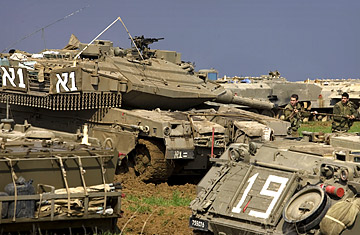
Israeli soldiers clean the barrel of a tank near Israel's border with the Gaza Strip
In war, weather matters. Israel's military offensive against Gaza was timed to coincide with three days of clear skies. Cloudlessness certainly helps the dozens of Israeli drones circling above the densely packed streets of the Palestinian seaside territory, using video and infrared cameras to search for possible targets.
Members of the militant group Hamas depend on the weather as well. For them, the cloudier it is the better. Firing off Qassam rockets into Israel is an inexact science. But given enough time to position the rockets properly — time which an overcast or rainy day can provide — Gaza's rocketmakers are far more likely to hit their intended targets. That's what happened on Monday evening when, as rain blanketed Gaza and much of Israel's south coast, a rocket launched from Gaza struck a playground in Ashdod, killing a mother of four as she waited at an adjoining bus stop. She was the third Israeli fatality since the assault began. According to Palestinian sources, Israeli attacks have killed more than 300 people in Gaza. (See pictures of Israel's deadly assault on Gaza.)
On Tuesday, the fourth day of Israel's offensive and a day of patchy clouds, Israeli warplanes continued to pound Gaza, destroying buildings allegedly linked to Hamas. In one incident, witnessed by this reporter from a hilltop overlooking the northeast corner of the Israel-Gaza border, an Israeli F-16 dropped a half-ton bomb on what appeared to be half a dozen rocket launchers. Even as the heavy woomph of the bomb hitting the ground reached us, about three miles away, one of the rockets blasted skywards, likely triggered by the exploding bomb.
The weather is likely to get worse on Tuesday evening, which could well delay a ground offensive, according to a senior military source. In Gaza's mishmash of streets and buildings, drones will be used to guide soldiers and help tanks and other vehicles navigate their way.
A ground offensive is still likely. For the past two days, Israeli leaders have said they will not agree to an early cease-fire and instead want to cripple Hamas permanently. Sources in Israel's Defense Ministry said Defense Minister Ehud Barak gave France's Foreign Minister, Bernard Kouchner, a polite "no" to his request for a 48-hour cease-fire. But today, as the voices of well-known Israeli writers joined the call for an immediate end to hostilities, the idea of a cease-fire was still being debated, according to the Defense Ministry sources. It's probably no coincidence that the next day or two are likely to bring bad weather.
